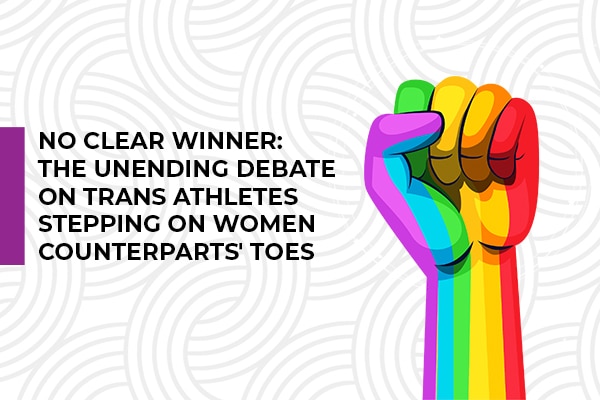No clear winner: The unending debate on trans athletes stepping on women counterparts’ toes

Author : Janani Sampath
Recently, when Laurel Hubbard, a weightlifter from New Zealand, qualified for the Tokyo Olympics, a new chapter was written — of the first trans person to qualify for the biggest sporting event in the world.
However soon after that, social media was abuzz with discussions — what chance do women athletes stand if transgender women are allowed to compete alongside in the same category, considering the residual physiological advantages they carry even after the transition?
In the last few years, the transgender community has been visible in an array of fields, including sports, indicating a growing acceptance.
Tokyo Olympics has been historic for the marginalized group as at least nine trans persons participating across categories have vied for a spot in it.
However, the intermittent debate regarding the natural advantages transgender women carry when compared to cisgender women has gathered steam yet again.
Why is it a big deal?
The debate in the United States has been mind-boggling for different reasons. Last year, Idaho State in the US banned participation by transgender women and girls in women’s sports. The law was contested by a transgender woman, saying that it was completely against the guidelines practiced by other bodies and specifically in the Olympics.
A recent study by the British Journal of Sports Medicine has shown that transgender women continue to have muscle and strength advantages despite undergoing testosterone suppression for a year. World Athletics and International Olympics Committee have recommended the 12-month period for a level-playing field. Nonetheless, the United Nations has been openly against such hormone suppression.
What does it mean for women’s sports?
Women’s representation in sports has seen a gradual rise in the last 100-odd years, since the time they first participated in the second Olympics held in 1900.
Even though the gap between men’s and women’s participation in sports events has narrowed over the years, a few issues remain.
Accommodating transgender athletes and sportspersons is a contemporary issue that challenges the growth of women athletes and sportspersons who have been waging other battles like equity and equality.
According to the Japanese Center for Research on Women in Sports, there are hurdles like balancing a sports career and a personal life, apart from the smaller number of women coaches and executives. There are also concerns about a smaller audience for women’s sports.
Late last year, a webinar organized by the Yale University Women’s Organization titled “Women in the Olympics – ‘Impractical, uninteresting, ungainly … and improper’” revisited the views of the founder of the International Olympic Committee Pierre de Coubertin in 1912 description of women competing in the Olympics, apart from discussing contemporary challenges. Speakers at the webinar highlighted that despite the big strides by women in the field, the Olympic committee remains dominated by men.
The speakers also noted that the claim about men sports gaining more viewers was a chicken and egg situation— if there are more takers for them, they will continue to have a fan base. The same webinar also highlighted the challenges arising from the classification of intersex and transgender participants in the event.
What is the way out?
Women have been successfully pushing frontiers, breaking molds and glass ceilings across arenas. The imprints they aim to create in sports, after a massive struggle against the patriarchal setup, are commendable. However, they are grappling with a conundrum that seems far from being unraveled any time soon.
As for transgender women, hope has just emerged on the horizon. When societies are striving to be non-discriminatory and inclusive, the latest debate is unfortunate, though unavoidable. Banning transgender women participants altogether because of the advantage they come with is unfair. So, is creating a separate category for them the way forward? Would that give them the place rather than pitting them opposite a group that has just found its feet? Would that be viable, considering that they will still be a smaller group to claim a whole category for themselves?









